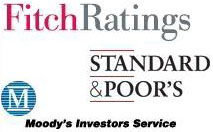One of the big villains in the housing bubble was the ratings agencies. Providing ratings for complex securities is lucrative business, and in order to get it the agencies implicitly — or sometime explicitly — colluded with issuers to provide  higher ratings for their securities than they deserved. The conflict of interest is obvious: having the issuer of a security pay for its rating is like having a student pay his professor for a grade. Dean Baker explains what to do:
higher ratings for their securities than they deserved. The conflict of interest is obvious: having the issuer of a security pay for its rating is like having a student pay his professor for a grade. Dean Baker explains what to do:
The obvious way to fix the conflict is to take away the hiring decision from the issuer. The issuer would still pay the rating agency but a neutral party — the SEC, the stock exchange on which the company is listed, the local baseball team — would make the decision as to which agency gets hired.
I guess this is my question: if you do this, the ratings agencies no longer have any incentives to do much of anything. There are three of them, and presumably each one would get a third of the business at a price set by the SEC. So their incentive would be to hire the cheapest possible analysts and cut costs to the bone. The result would be ratings agencies even less able to cope with complex modern securities than the current ones.
This is what stonkers me about the ratings dilemma: there just doesn’t seem to be any good answer. Turning the ratings agencies into regulated utilities might be better than the current situation, but not by much. And if you’re going to do that, why bother with ratings agencies at all? Why not just have the SEC provide ratings?
I’ve read other proposed solutions too. Open up the business to more firms, for example, or pay the agencies based on the accuracy of their ratings. But the first doesn’t really get at the conflict of interest, and the second is difficult because it often takes years before you know if a rating is accurate.
I remember once someone telling me that after every financial crisis ever, the ratings agencies are always rolled out as sacrificial lambs. They had always been too optimistic, or too stupid, or too corrupt, or something. And then there’d be a hue and cry about “fixing” them, even though the real problem was that every single person on Wall Street, buyers and sellers alike, had wanted them to do exactly what they did: help inflate a bubble that made everyone truckloads of money. The hue and cry, he suggested, was more a way of deflecting blame from the real villains than it was a serious attempt to address an underlying problem.
I don’t remember who told me that, and I don’t even know for sure if it’s true. It’s stuck with me, though. I’m just not sure what the answer is here.
















